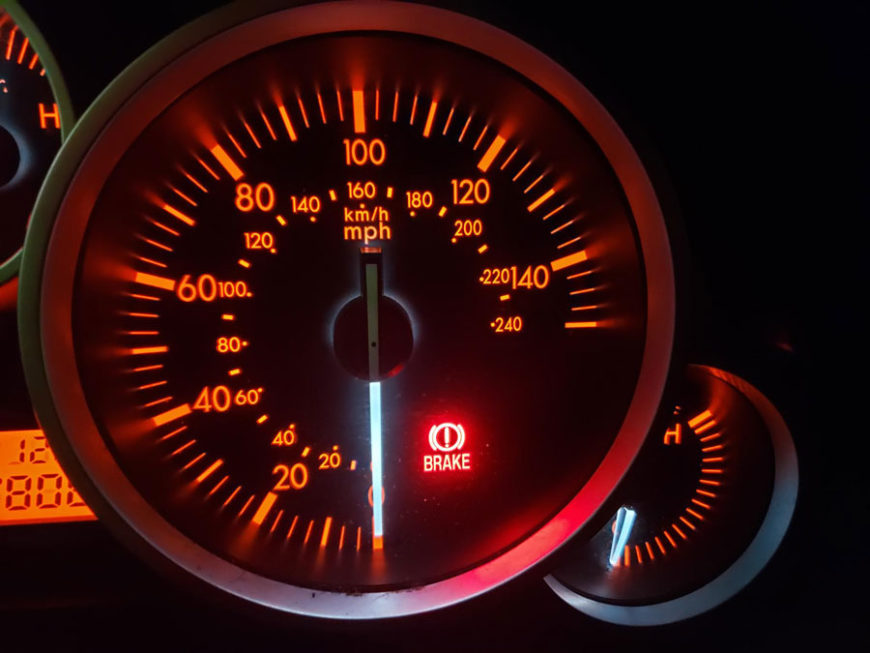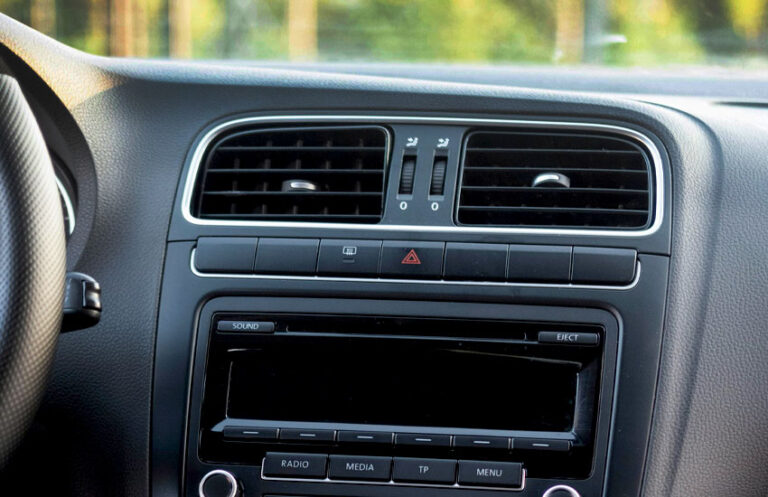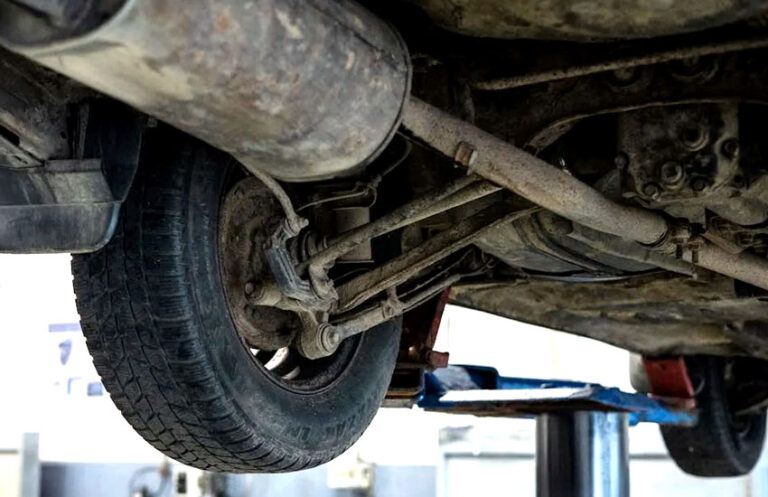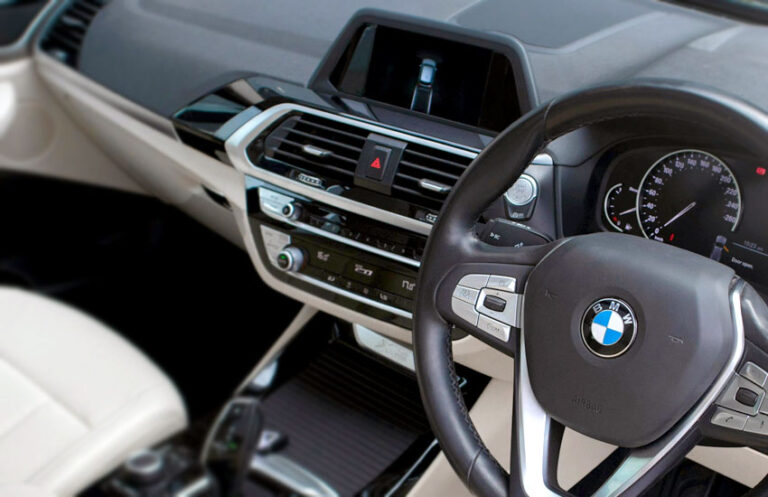The brake light turning on and off indicates a potential issue with the brake system. In some cases, it may be due to a loose or damaged connection.
Brake lights are a crucial safety component in vehicles, alerting drivers behind you when you’re slowing down or stopping. However, if your brake light starts flickering or intermittently turning on and off, it could be an indication of a problem.
This issue should not be ignored, as it can compromise your safety on the road. While there could be various reasons behind a brake light behaving this way, one common cause is a loose or damaged connection. We will explore the possible causes of a brake light turning on and off and discuss potential solutions to help you resolve the issue promptly and ensure your safety while driving.

Credit: www.autotechiq.com
Common Causes Of Brake Light Issues
When you notice your brake light coming on and off, it can be a cause for concern. Ignoring this warning sign can have serious implications for your safety on the road. Understanding the common causes of brake light issues can help you diagnose and address the problem before it escalates. In this article, we will explore three common culprits behind brake light problems: loose wiring connections, low brake fluid levels, and worn brake pads.
Loose Wiring Connections
One possible reason for your brake light intermittently turning on and off is loose wiring connections. The vibrations and movements experienced while driving can sometimes loosen the electrical connections in your braking system. When this occurs, it can disrupt the signal being sent to your brake light, causing it to behave erratically.
To check for loose wiring connections, you can start by inspecting the connections between the brake light switch and the brake pedal. Ensure they are securely fastened and free from any corrosion or damage. It’s also worth examining the wiring harness that connects to your brake lights, looking for any loose or frayed wires. If you discover any loose connections, it is recommended to have a professional mechanic fix them, as they have the expertise to ensure a proper and safe repair.
Low Brake Fluid Levels
Another possible cause of your brake light turning on and off is low brake fluid levels. Brake fluid plays a crucial role in your braking system, helping to transmit the force exerted on the brake pedal to the brake calipers. When your brake fluid levels are low, it can lead to a decrease in brake performance and trigger the brake warning light to illuminate.
To determine if low brake fluid levels are the culprit, locate the brake fluid reservoir under the hood of your vehicle. It is typically located near the brake master cylinder. Check the fluid level and if it is below the “MIN” or “ADD” mark, topping it up to the recommended level might resolve the issue. However, it’s important to note that low brake fluid levels can indicate a leak in your braking system, which should be inspected and repaired by a professional mechanic.
Worn Brake Pads
Worn brake pads can also contribute to a brake light that turns on and off sporadically. Brake pads are essential components of your braking system that grip the rotors to slow down or stop the vehicle. Over time, these pads become worn out due to the friction generated during braking. As they wear down, it can trigger the brake fluid reservoir’s sensor to detect low brake pad thickness, leading to the brake light illuminating.
To check if your brake pads are worn, visually inspect them through the openings in the wheels. If they appear thin or close to the metal backing plate, it’s a clear sign that they need to be replaced. It’s crucial not to delay replacing worn brake pads, as they can compromise your vehicle’s braking efficiency and safety. Seek professional assistance to have the brake pads inspected and replaced if necessary.
Understanding The Signs And Symptoms
If your car’s brake light is flickering on and off, it could indicate issues with the brake system. Look out for signs like the brake pedal feeling spongy or making strange noises. Addressing these symptoms promptly can prevent more serious problems in the future.
Understanding the Signs and Symptoms When it comes to maintaining the safety and functionality of your vehicle, it’s important to pay attention to the signs and symptoms that may arise. One common issue that drivers may encounter is the intermittent illumination of the brake light. This can be a cause for concern, as it indicates that there may be a problem with your braking system. In this article, we will delve into this issue and explore the signs and symptoms that you should be aware of.Intermitent Illumination Of Brake Light
The intermittent illumination of the brake light can be a perplexing issue for drivers. This occurs when the brake light on your dashboard comes on and off sporadically, without any apparent reason or pattern. It can be a cause for frustration and confusion, as it leaves drivers wondering if there is an actual problem with their braking system or if it’s just a faulty sensor. There are several potential causes for this issue. One possibility is that there may be a loose wire or connection in the brake light circuit. This can cause the brake light to flicker on and off as the connection is disrupted. Another potential cause is a faulty brake light switch. If the switch is not functioning properly, it can cause the brake light to illuminate intermittently. Additionally, the intermittent illumination of the brake light may also be an indicator of a more serious issue with your braking system. For example, it could indicate that there is a problem with the brake fluid level or pressure. Low brake fluid levels or an issue with the brake fluid pressure can affect the overall performance of your brakes, leading to potential safety hazards on the road.Spongy Brake Pedal Feel
Another sign and symptom that may accompany the intermittent illumination of the brake light is a spongy brake pedal feel. This refers to a brake pedal that feels soft and mushy when pressure is applied. Instead of providing a firm and responsive feel, the brake pedal may feel like it’s sinking or lacking in resistance. A spongy brake pedal feel can occur for a variety of reasons. One possible cause is air in the brake lines. When air enters the brake lines, it can create a spongy feel when the brake pedal is depressed. Another potential cause is a problem with the brake fluid. If the brake fluid is contaminated or old, it can affect the performance of the braking system. It’s important to address the issue of a spongy brake pedal feel, as it can compromise your ability to stop quickly and effectively. If you experience this symptom along with the intermittent illumination of the brake light, it’s crucial to have your braking system inspected and repaired by a qualified mechanic. In conclusion, understanding the signs and symptoms that accompany the intermittent illumination of the brake light is essential for maintaining the safety and functionality of your vehicle. Whether it’s a loose connection, a faulty brake light switch, or a more serious issue with your braking system, it’s important to address these problems promptly. By taking action and seeking professional assistance, you can ensure that your brakes are in optimal condition and that you can navigate the roads with confidence and peace of mind.Diagnostic Steps For Drivers
When your brake light comes on and off, it’s essential to take prompt action to ensure your safety on the road. As a driver, understanding the diagnostic steps can help you identify and resolve the issue before it escalates. By following these simple steps, you can address the problem effectively and maintain your vehicle’s optimum performance.
Checking Wiring And Connections
Firstly, ensure to examine brake light wiring and connections for any signs of damage or loose connections. Use a voltage meter to test the wiring and connections for any irregularities. Look for exposed wires, fraying, or corrosion, as these can cause intermittent brake light issues.
Inspecting Brake Fluid Levels
Confirm that the brake fluid levels are within the recommended range by checking the reservoir. Low brake fluid levels can trigger the brake light to come on intermittently. If the levels are low, top up the brake fluid according to the manufacturer’s specifications to ensure the system operates effectively.
Examining Brake Pads And Discs
Regularly inspect the brake pads and discs for wear and tear. Worn-out brake pads or discs can cause the brake light to come on and off unpredictably. Make sure the brake pads are not excessively worn and that the discs are free from damage. Replace any components that show signs of wear to prevent potential brake system malfunctions.
Safety Precautions And Warning
- Regularly inspect brake lights for proper functioning.
- Immediate action can prevent potential safety hazards.
- Ensure proper visibility to other drivers on the road.
Potential Risks Of Ignoring Brake Light Issues
- Decreased visibility may lead to rear-end collisions.
- Failure to signal braking intentions can cause accidents.
- Ignoring warnings can result in costly repairs or fines.
Tips For Temporary Solutions
When the brake light on your vehicle comes on and off unexpectedly, it can be concerning. Here are some tips for temporary solutions to help you address this issue until you can seek professional assistance:
Emergency Brake Use
- Engage emergency brake gently to see if it affects the functioning of the brake light.
Seeking Professional Assistance
- Consult a qualified mechanic to diagnose the root cause of the brake light issue.

Credit: directpaintandcollision.com
The Role Of Professional Mechanics
Expert Diagnosis And Repair
When your brake light comes on and off, it’s crucial to seek help from professional mechanics. Expert diagnosis of the issue can prevent further damage to your vehicle and ensure your safety on the road. A skilled mechanic can identify the root cause of the problem and provide the necessary repairs to resolve the issue once and for all.
Preventive Maintenance Advice
Professional mechanics also offer valuable preventive maintenance advice to help you avoid future brake light issues. They can recommend regular brake inspections, fluid checks, and other maintenance tasks to keep your vehicle in top condition and prevent unexpected warning light problems. It’s essential to follow their guidance to maintain the optimal performance of your brakes and ensure your safety while driving.
Legal And Financial Implications
When your brake light intermittently comes on and off, it’s crucial to address the issue promptly due to the potential legal and financial implications. Ignoring brake light issues can lead to legal repercussions, as it is a violation of traffic laws in most jurisdictions. Additionally, continuing to drive with a malfunctioning brake light can result in costly repairs and replacements that could have been avoided with timely attention. Let’s explore the legal and financial ramifications of neglecting brake light problems.
Legal Repercussions Of Ignoring Brake Light Issues
Driving with a malfunctioning brake light not only compromises your safety but can also land you in trouble with the law. In most states, it is against the traffic regulations to drive without functioning brake lights. Law enforcement officers can issue you a citation or impose fines for failing to maintain a properly working brake light system.
Costs Of Repairs And Replacements
By ignoring the intermittent brake light issue, you may end up facing substantial expenses down the line. Timely repairs and replacements are essential to address the problem before it worsens. Ignoring the issue can lead to further damage and result in more expensive repairs. Additionally, prolonged use of a faulty brake light can cause electrical issues or damage to other components of your vehicle, leading to additional costs.
To give you an idea of the potential costs involved, here is a breakdown of typical expenses related to brake light repairs and replacements:
| Repair/Replacement | Approximate Cost |
|---|---|
| Bulb Replacement | $10 – $30 |
| Wiring Repair | $50 – $150 |
| Brake Light Switch Replacement | $100 – $200 |
| Control Module Replacement | $150 – $500 |
Please bear in mind that these costs may vary depending on your vehicle make and model, as well as the labor rates in your area. However, regardless of the exact figures, the expenses associated with brake light repairs and replacements can add up quickly if not addressed promptly.
In conclusion, it is crucial to prioritize the timely resolution of any brake light issues to avoid legal consequences and unnecessary financial burdens. By promptly addressing and fixing the intermittent brake light problem, you can ensure the safety of yourself and others on the road, as well as save yourself from potential legal troubles and costly repairs.

Credit: www.autozone.com
Conclusion And Proactive Approach
If your brake light flickers on and off, take proactive measures to diagnose the issue promptly. Addressing this warning signal early can prevent potential safety hazards on the road. . inspect braking system components and seek professional assistance if needed.
Prioritizing Safety On The Road
When it comes to your safety on the road, it is crucial to pay attention to any warning signs that your vehicle may be giving you. One common issue that many drivers face is when the brake light comes on and off sporadically. While it may not seem like a serious problem at first, it is important to address it promptly to prevent any potential accidents or further damage to your vehicle.
Regular maintenance is key to ensuring the longevity and reliability of your car. By following a proactive approach, you can identify and resolve potential issues before they escalate into a full-blown problem. When you notice that your brake light comes on and off unpredictably, it is essential to take immediate action to maintain your safety on the road.
Regular Maintenance As A Preventive Measure
Regular maintenance serves as a preventive measure that can save you from costly repairs and ensure your vehicle’s optimal performance. By addressing potential issues promptly, you can avoid breakdowns and maintain the safety of yourself and others on the road.
When you encounter a situation where your brake light intermittently comes on and off, it is time to prioritize a proactive approach towards your vehicle’s maintenance. Here are a few basic steps you can take:
- Check brake fluid levels: Low brake fluid levels can trigger the brake light. Instructions on how to check your brake fluid can usually be found in your vehicle’s owner manual. If the levels are low, it is important to top up the fluid to the appropriate level.
- Inspect brake pads: Worn-out or damaged brake pads can also cause the brake light to come on. Inspect your brake pads for any visible signs of wear and tear. If necessary, have them replaced by a professional mechanic.
- Examine the brake system: Faulty sensors or a malfunctioning brake system can trigger the brake light to illuminate. Consulting a qualified mechanic to examine your brake system is crucial in order to accurately diagnose and resolve any underlying issues.
Remember, regular maintenance not only ensures your safety but also extends the lifespan of your vehicle. By taking a proactive approach towards your vehicle’s maintenance, you can enjoy a smoother and worry-free driving experience.
Conclusion
If your brake light is constantly flickering on and off, it’s important to address the issue immediately. Ignoring it could lead to serious safety risks on the road. Regular maintenance and thorough diagnosis by a professional mechanic can help prevent potential accidents and ensure your vehicle’s safety.
Stay proactive and stay safe.









